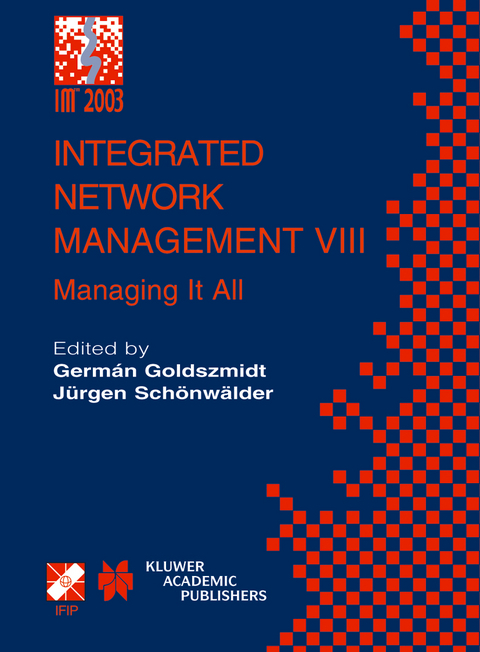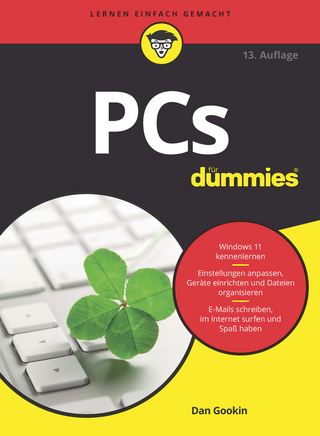
Integrated Network Management VIII
Managing It All
Seiten
2013
|
Softcover reprint of the original 1st ed. 2003
Springer-Verlag New York Inc.
978-1-4757-5521-3 (ISBN)
Springer-Verlag New York Inc.
978-1-4757-5521-3 (ISBN)
To be successful, these future management systems must provide global scalability, for instance, to support Grid computing and large numbers of pervasive devices. Management systems must also support the management of business processes and their supporting technology infrastructure as integrated entities.
Welcome to 1M 2003, the eighth in a series of the premier international technical conference in this field. As IT management has become mission critical to the economies of the developed world, our technical program has grown in relevance, strength and quality. Over the next few years, leading IT organizations will gradually move from identifying infrastructure problems to providing business services via automated, intelligent management systems. To be successful, these future management systems must provide global scalability, for instance, to support Grid computing and large numbers of pervasive devices. In Grid environments, organizations can pool desktops and servers, dynamically creating a virtual environment with huge processing power, and new management challenges. As the number, type, and criticality of devices connected to the Internet grows, new innovative solutions are required to address this unprecedented scale and management complexity. The growing penetration of technologies, such as WLANs, introduces new management challenges, particularly for performance and security. Management systems must also support the management of business processes and their supporting technology infrastructure as integrated entities. They will need to significantly reduce the amount of adventitious, bootless data thrown at consoles, delivering instead a cogent view of the system state, while leaving the handling of lower level events to self-managed, multifarious systems and devices. There is a new emphasis on "autonomic" computing, building systems that can perform routine tasks without administrator intervention and take prescient actions to rapidly recover from potential software or hardware failures.
Welcome to 1M 2003, the eighth in a series of the premier international technical conference in this field. As IT management has become mission critical to the economies of the developed world, our technical program has grown in relevance, strength and quality. Over the next few years, leading IT organizations will gradually move from identifying infrastructure problems to providing business services via automated, intelligent management systems. To be successful, these future management systems must provide global scalability, for instance, to support Grid computing and large numbers of pervasive devices. In Grid environments, organizations can pool desktops and servers, dynamically creating a virtual environment with huge processing power, and new management challenges. As the number, type, and criticality of devices connected to the Internet grows, new innovative solutions are required to address this unprecedented scale and management complexity. The growing penetration of technologies, such as WLANs, introduces new management challenges, particularly for performance and security. Management systems must also support the management of business processes and their supporting technology infrastructure as integrated entities. They will need to significantly reduce the amount of adventitious, bootless data thrown at consoles, delivering instead a cogent view of the system state, while leaving the handling of lower level events to self-managed, multifarious systems and devices. There is a new emphasis on "autonomic" computing, building systems that can perform routine tasks without administrator intervention and take prescient actions to rapidly recover from potential software or hardware failures.
Preface.- Symposium Committees.- Introduction.- Session 1: Anomaly/ Intrusion Detection.- Session 2: Internet Accounting.- Short Paper Session 1: Monitoring and Security.- Short Paper Session 2: Tools and Information Models.- Session 3: Provisioning and Service Management.- Session 4: Policy-Based Management.- Session 5: Monitoring and Performance.- Session 6: Configuration Management.- Session 7: Peer-to-Peer and overlay Networks.- Session 8: Distributed Management.- Short Paper Session 3: Configuration and Architectures.- Session 9: Information Modelling.- Session 10: SLA / Quality of Service.- Session 11: Management System Design.- Session 12: Fault Management.- Session 13: Power and Optical Management.- Panels.- Author Index.
| Erscheint lt. Verlag | 21.1.2013 |
|---|---|
| Reihe/Serie | IFIP International Federation for Information Processing ; 118 |
| Zusatzinfo | XXII, 722 p. |
| Verlagsort | New York, NY |
| Sprache | englisch |
| Maße | 155 x 235 mm |
| Themenwelt | Mathematik / Informatik ► Informatik ► Netzwerke |
| Mathematik / Informatik ► Informatik ► Theorie / Studium | |
| Informatik ► Weitere Themen ► Hardware | |
| Technik ► Elektrotechnik / Energietechnik | |
| Wirtschaft ► Betriebswirtschaft / Management | |
| ISBN-10 | 1-4757-5521-X / 147575521X |
| ISBN-13 | 978-1-4757-5521-3 / 9781475755213 |
| Zustand | Neuware |
| Informationen gemäß Produktsicherheitsverordnung (GPSR) | |
| Haben Sie eine Frage zum Produkt? |
Mehr entdecken
aus dem Bereich
aus dem Bereich
SOA, EDA & Microservices Mehrschichtenarchitekturen …
Buch | Softcover (2024)
Springer Vieweg (Verlag)
39,99 €
entwickle, drucke und baue deine DIY-Objekte
Buch | Hardcover (2023)
Hanser, Carl (Verlag)
34,99 €


